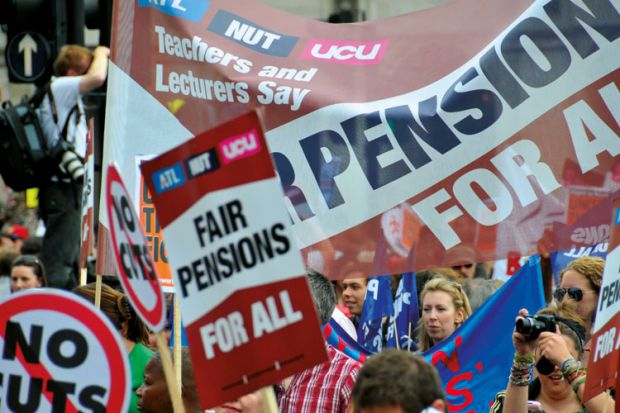Source: Alamy
Hot button issue: the University and College Union says it is ready to ballot branches about walkouts if pensions are reduced
Universities are set on a collision course with unions after confirming that they want to scrap final salary pensions offered by the sector’s biggest scheme to reduce an estimated £13 billion deficit.
Under the plans, about 130,000 higher education staff who currently pay into the Universities Superannuation Scheme’s final salary scheme would be moved to the career revalued benefits (CRB) scheme (or career average benefits scheme) that was introduced for new entrants in 2011.
Writing in this week’s Times Higher Education, Anton Muscatelli, vice-chancellor and principal of the University of Glasgow and chair of the Employers Pensions Forum, which represents Universities UK, GuildHE and the Universities and Colleges Employers Association, says that “more change is necessary to ensure that the sector is able to address the deficit”.
Professor Muscatelli says employers want “an extension of the [CRB] section to all active members and the closure of the final salary section”.
However, the change could result in an effective pay cut of 10 per cent as CRB pensions are far less generous in terms of employer contributions, one sector expert has warned.
Pensions consultant John Ralfe, a former head of corporate finance at Boots, said the annual cost to institutions of providing a final salary pension was 19.9 per cent of pay compared with 11.3 per cent for CRB, based on USS figures released in 2011. Changes in interest rates since then had increased the 8.6 percentage point difference to close to 10 points, he said.
The proposed reforms could lead to a repeat of the strike action in 2011 over similar plans to end final salary pensions for all. The University and College Union is ready to ballot branches about possible walkouts.
Radical change needed
The announcement from the Employers Pensions Forum – which follows draft options drawn up by the fund’s trustees – comes midway through a consultation with employers about the affordability of pensions provided by the USS, which Professor Muscatelli writes is suffering a “very substantial deficit”.
Radical changes are required, he says, to reduce the risk in the scheme in order “to avoid future unaffordable contribution increases for both employers and members”.
The Employers Pensions Forum was considering CRB benefits “to be provided up to a specified salary threshold, with an additional defined contribution element being provided in respect of salary above this threshold”, he adds. This would ensure that “all members would retain a core defined benefit, with more significant benefit changes applying to the scheme’s higher earners”.
The Employers Pensions Forum declined to provide further details of a possible salary threshold or the contribution rate above the cap, but private sector employers that have ended their final salary schemes have typically set it at about £100,000, said Mr Ralfe.
He said that for someone on a salary of £150,000, “if the cap is fixed at £100,000 with a 15 per cent contribution above this, you would earn a career average on £100,000 and then 15 per cent of £50,000 – £7,500 – paid into a separate defined contribution pot”.
This scheme significantly reduced the risk of providing massive pensions to high earners (some in the sector will currently pick up pensions worth more than £100,000 a year), he said.
“High earners do not benefit as much as low earners, so it is more egalitarian,” he explained.
Jim Naismith, professor of chemical biology at the University of St Andrews, who has studied the USS, said he thought that the biggest losers will “most likely be those under 50 not yet promoted but who go on to be promoted”.
He said a “key question” was whether staff would have the option of the top-up defined contribution being paid immediately by employers as salary. “For higher paid staff, if they are to take responsibility for themselves then surely they should be given this choice.”
Professor Naismith added that the few details available about the new scheme showed it was “politically well judged”. “It gives a guaranteed base and divides staff, further undermining solidarity,” he said.
The Employers Pensions Forum said a valuation of the USS’ deficit, due to be announced this autumn, would shape its proposals, which would then be submitted to the scheme’s joint negotiating committee, which includes unions.
“Employers will undertake a consultation with employees on proposed changes to benefits early in 2015 before final decisions are made,” it added, but said it would make the case for change before then.
A UCU spokesman said that it had challenged the methodology used by the USS to value the scheme’s assets, which it believed is “flawed and has resulted in an inflated deficit prediction”.
The approach adopted by the USS board had created “a need to introduce overly radical detrimental changes for members”, he added.





